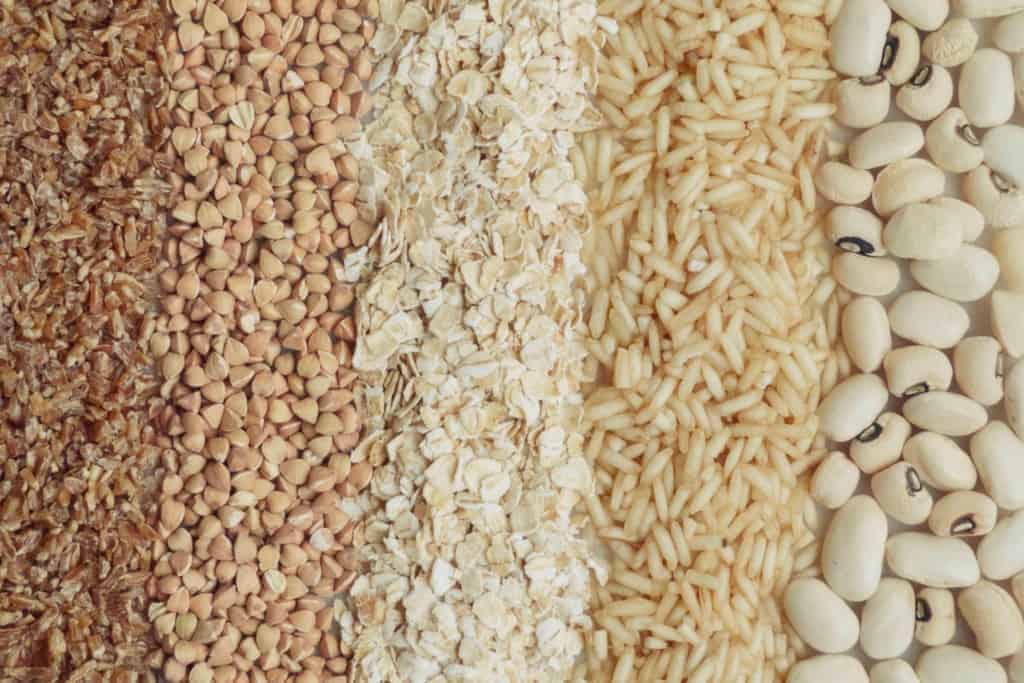Food of the Month – Whole Grains

Click here for a quick and easy, no-cook Overnight Oats recipe.
Whole grains are the seeds of cultivated grasses used as food. Considered a storage crop, whole grains are currently a controversial food type in the media world.
Nutrition: Whole grains retain the nutrition of the entire kernel. The germ provides healthy plant oils, the bran provides fiber, protein, and B vitamins, and the endosperm contains starches which quickly break down into sugar.
Refined grains are stripped of their germ and bran, often “enriched,” with some but not all nutrients added back during processing. While refined grains are associated with increased risk for obesity and Type 2 Diabetes, whole grains have the opposite effect.
Bloating followed by eating grains may be a sign of eating too fast without imparting enough saliva to those chewed bites. In order to properly digest carbohydrates, we depend on digestive enzymes found in saliva. If our saliva doesn’t effectively coat these carbohydrates, we may experience digestive distress.
FYI: The seven ancient grains are amaranth, millet, kamut, sorghum, teff, faro, and freekeh.
The protein content of wheat flour determines how it is used in baking. Bread flour has 12-13%, all purpose flour has 9-12%, and cake flour has the least protein at 5-8% lending a light, airy finished product.
Balance the high carb content of whole grains by mixing them into salads or soups. Always pair bread and crackers with protein such as peanut butter, cheese, or a lean meat. For even more balance, add vegetables.
Storage Tips: Whole grains are prone to oxidation, which can create off flavors. For best results, store in tightly sealed containers. Freezing can also help limit exposure to oxygen.
Celiac disease is an autoimmune reaction to the protein gluten found in grains such as wheat, barley, and rye. Approximately one percent of the US population has this condition.
Skagit County is famous for its grain research and agriculture. Whether heritage varieties bred at the Breadlab and WSU, grains malted for the brewing and distilling industries by Skagit Valley Malting, or grain locally milled into flour by Cairns Springs, Skagit cereals provide a unique opportunity to enjoy high quality, locally grown grain products.
 Amber Phillips, MS, RD is a registered dietitian at Island Hospital. She has a Master’s degree in nutrition from Bastyr University in Kenmore, WA and a Bachelor’s degree in biology from Metropolitan State University, St. Paul, MN. Phillips has a keen interest in community education. “Nutrition advice can be confusing and sometimes conflicting,” says Phillips. “My role as a dietitian is to follow the latest research and make it easy to understand for my patients and the public.” To schedule an appointment with Phillips, call (360) 299-1300 x2567.
Amber Phillips, MS, RD is a registered dietitian at Island Hospital. She has a Master’s degree in nutrition from Bastyr University in Kenmore, WA and a Bachelor’s degree in biology from Metropolitan State University, St. Paul, MN. Phillips has a keen interest in community education. “Nutrition advice can be confusing and sometimes conflicting,” says Phillips. “My role as a dietitian is to follow the latest research and make it easy to understand for my patients and the public.” To schedule an appointment with Phillips, call (360) 299-1300 x2567.
Published on March 19, 2021
